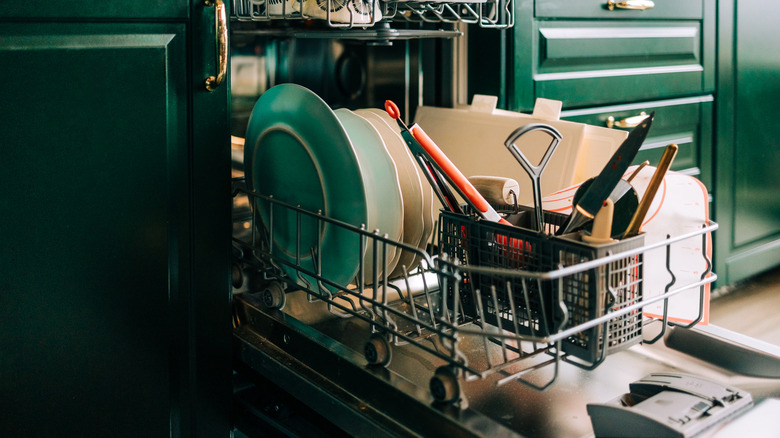Does Having This Common Kitchen Appliance Make Sense Anymore?
Consumer habits are constantly evolving as priorities adapt to not only a faster lifestyle, but also more time spent at home. Adding to these habits is a growing environmental awareness, an issue that has been caught in the crossfire of the similarly expanding political divide. All of these factors affect how Americans choose to equip their homes, particularly the kitchen, which plays a vital role in daily routines. One appliance that has become quite the hot topic in this discussion is the dishwasher.
Dishwashers were once seen as breakthroughs for reclaiming leisure time from the shackles of domestic labor, particularly for women. These days, however, more and more people are rethinking the need for this machine in the home. Three possible trends could be at the core of this shift: smaller homes with less kitchen space, the decrease in home-cooked meals leading to fewer dirty dishes, and the performance of dishwashers that, due to stricter energy efficiency standards, now take twice as long to complete a cycle.
Reasons to ditch your dishwasher
There are many hidden downsides to dishwashers. As relieving as it can be to know that there's a machine waiting for you in the kitchen that can take care of all the dirty dishes produced by the meal you've just spent hours preparing, sometimes a dishwasher can also be a nuisance. As homes get smaller, keeping such a sizeable item in the kitchen may no longer be realistic for a lot of people. Similarly, as families shrink and fewer people choose to have children, households may not even be able to accumulate a full load before they need to use those dishes again.
Additionally, the best dishwashing cycle for the cleanest dishes and the least water/energy consumption tends to take upward of two hours, which only increases the time in between dish usage. Opting for shorter cycles produces worse results and may even require pre-washing, which just makes dishwashers seem even more useless. If you have to go through the effort of pre-washing to have your dishes ready in half an hour rather than two, you might as well complete the job and have them ready in minutes.
All of these factors can make spending an average $600 on a mid-range dishwasher sound like a bad idea. However, if you're passionate about helping the environment and saving a few good dollars on your utility bills, buying a dishwasher is one of the best investments you can make.
Reasons to keep it
For someone living alone or for a two-person household, owning a dishwasher may not make much sense, but there's no denying that this appliance has great benefits for larger families, especially if you're able to deftly manage your time to accommodate the longer cycles. Eco mode is the often overlooked dishwasher setting that could save you money, all while reducing your home's carbon footprint.
According to a 2020 study published in the Environmental Research Communications journal, "machine dishwashers produce 63% less [greenhouse gas] emissions over their life cycle than manual dishwashing." And the gap can be further widened if users follow the manufacturer and the Energy Star energy-efficiency program's recommendations for best practices. These include loading the machine correctly, using rinse aids, detergent packs, and occasionally cleaning the inside of your dishwasher.
Opting for Energy Star-certified dishwashers is important, however. This government-backed label is given to energy-efficient models that comply with strict standards. Although some politicians have been trying to loosen these regulations to bring back quicker, more potent cycles, the little blue stamp is still a reliable certification. Per the Department of Energy, one of these machines spends "less than half of the energy" of handwashing and "saves more than 8,000 gallons of water" per year. This can result in yearly savings of about $220, as stated on the Energy Star website.


